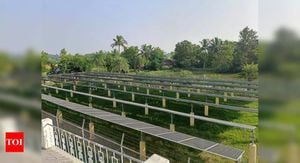Farmers across the UK are set to stage one of their largest protests yet, converging on Westminster this week as anger brews over recent inheritance tax changes proposed by the government. The announcement has triggered deep frustration among farmers, who feel increasingly disconnected from policy makers. This discontent echoes past grievances, creating what could be one of the largest rural protests since Labour's last term in power.
Among the high-profile farmers expected to attend is Jeremy Clarkson, the television personality known for his outspoken views. Estimates of attendance range wildly, with predictions of anywhere from 10,000 to 40,000 participants. The controversy ignited nearly three weeks ago during the recent Budget, when the government declared plans to implement inheritance taxes on certain farms, inciting protest planning across the agricultural community.
Despite the government’s reassurances, doubts persist over the coverage and impact of the tax changes. BBC Verify has attempted to clarify the situation, but the embedded distrust remains palpable. Many farmers perceive this move as yet another example of political disregard for rural communities. Baroness Mallalieu, president of the Countryside Alliance and Labour peer, criticized the government’s approach, stating it “smells of incompetence,” highlighting the perceived urban-rural divide within the party.
With Prime Minister Rishi Sunak attending the G20 summit and sharing the view of minimal future impact on the majority of farmers, some remain skeptical. He stated, “Most farmers will not be affected by the changes,” reinforcing the narrative from ministers. Yet, farmers argue such claims do little to assuage their mounting anxieties. The reality is much more nuanced, with increased uncertainty around government agriculture policies stirring discontent.
Critics assert the measures surrounding inheritance tax reflect broader issues, particularly years of feeling marginalized and unsupported post-Brexit. Farmers point to challenges including problematic trade deals and reduced subsidies as accumulating pressures prompting this backlash. One farming source articulated this sentiment, describing inheritance tax as "the straw breaking the camel's back.”
Long-standing frustrations tie back to recent political actions on farming, raising the specter of mass disillusionment. The House of Commons Library notes only 3.7% of estates were affected by inheritance tax as of the 2020-21 period, yet the emotional weight of the tax lies heavily upon many, leading to perceptions of injustice and double taxation on efforts to provide for family legacies.
The growing protest simultaneously garners unintended attention from far-right groups, who attempt to leverage the situation for their narrative. Social media platforms have seen extremist figures, including associates of Tommy Robinson, co-opting the farming community's issues to promote their agenda, which has caused concern among protest organizers. They are adamant their focus remains on the farmers’ plight, not political exploitation.
One noted farm organizer, Olly Harrison, firmly stated the event is non-political, inviting balanced representation from various political parties without endorsing any individual agenda. Harrison indicated dissatisfaction with attempts to politicize the gathering, which he reiterates centers on preserving the credibility of British farming and addressing immediate financial threats posed by tax changes.
Compounding the farmers’ distress is the significant subsidy cut unveiled during the Budget, with allocations to farm support slashed by 79%. This sudden shift has raised alarms as farmers face the harsh reality of diminishing returns from national aid they had grown reliant upon.
Rachel Reeves, the Chancellor, has defended the tax changes as fair and necessary, making clear her government’s stance on tax implementation. According to her, the policies reflect fiscal obligations rather than punitive measures against farmers. Farmers, on the other hand, counter her claims, expressing they feel targeted and unsupported by recent reforms.
The anticipated protest is about more than just finances; it encapsulates years of frustration, loss of faith, and feelings of betrayal among farmers who believe their contributions to food security and the economy are being overlooked. The outdoor event may incite memories of the major rural protest held two decades ago, where around 400,000 farmers marched to voice their demands.
With the specter of unrest looming, attention turns to the broader ramifications should farmers' frustrations remain unaddressed. The convergence at Westminster may well mark not only another chapter of protest history but possibly the dawn of significant agricultural policy reevaluation if the government fails to read the mood of the countryside.
This protest is poised to be not just about tax changes, but about the future direction of farming policy amid inevitable economic shifts and societal expectations. Farmers are determined to make their voices heard, signaling to policymakers the urgency of listening and reconsidering their approach toward the very backbone of Britain’s food supply.



